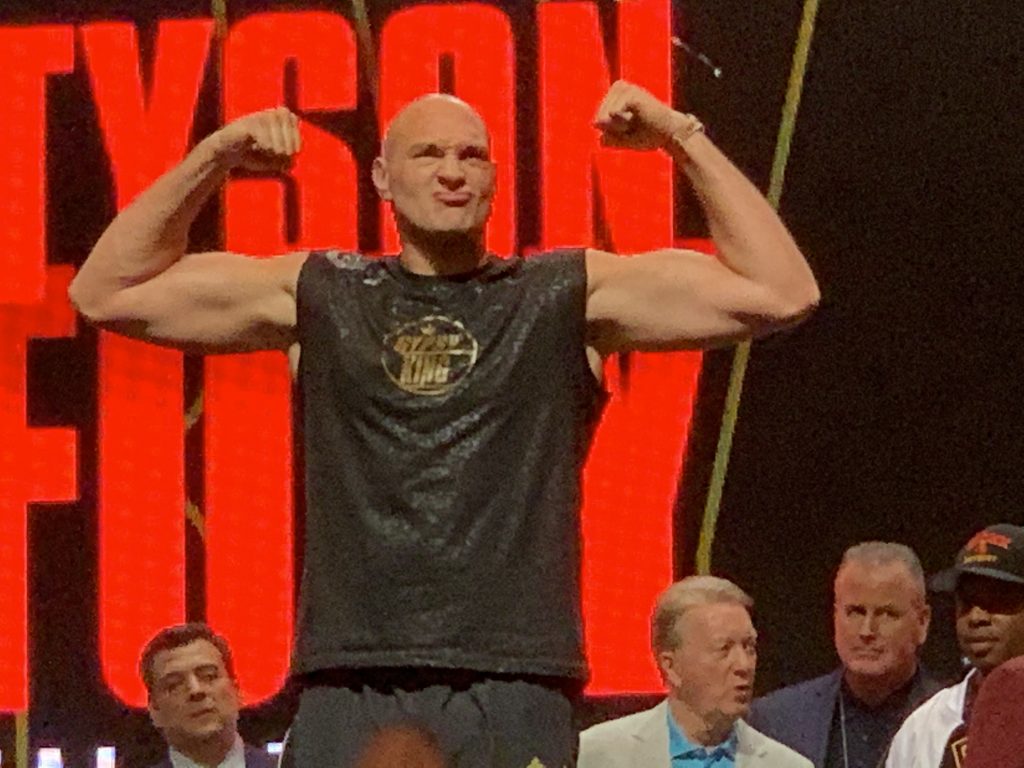After The Beatdown: Tyson Fury has some empathy for Deontay Wilder

By Norm Frauenheim-
Deontay Wilder is a predictable target on sociopath media these days. Anybody, which means just about everybody, with a keyboard and an insult is piling on in the wake of his one-sided loss to Tyson Fury.
Everybody, that is, but Fury.
The fundamental goodness in Fury has been evident throughout interviews this week in the UK. Fury beat him up. Forced his corner to surrender in the seventh round. Within the ropes, he showed no mercy. Outside of them, he has shown empathy for a fellow fighter struggling to come to terms with his first defeat.
In part, perhaps, that’s because Fury has already been trashed by the virtual vigilantes, who have buried Wilder beneath their malice for blaming his loss on the collection of nuts, bolts and batteries that were part of his armored costume. The 40-pound get-up weakened him in his walk to the ring, Wilder said before video surfaced of him saying he trained while wearing a 45-pound weighted vest.
There’s been no bunker deep enough, no armored suit protective enough, to shield him from what has followed.
Fury has been there, a target of public shaming, during dark days of drinking, drugging, eating and agonizing in the aftermath of his 2015 upset of Wladimir Klitschko.
He was the heavyweight champ with heavyweight mental issues, an accident in the making and always in the headlines. He was stripped of his titles and stripped of his sanity. But he made it back, came back with a unique understanding of the kind of adversity now facing Wilder.
Fury came into the ring to Patsy Cline’s country classic, Crazy. Fury knows something about crazy.
“I can understand where he’s coming from,” Fury told ITV’s This Morning. “In every fighter’s mind, there’s got to be a reason why they’ve lost. It can never be a simple fact (of) I wasn’t good enough on the night and lost to the better guy. It’s always got to be: ‘The camp was wrong. It was the trainer’s fault. It was my suit, it was my toe.’
“With me, if I’m injured or whatever the problem is, it’s like, ‘OK, the performance wasn’t great. But I’m going to move on and crack on.’ ‘’
The question is whether Wilder will be able to move on. He’s already exercised a contract clause for a third fight, tentatively set for July 18 at Las Vegas MGM Grand, site of the last bout. With an interim fight, Wilder might be able to restore some confidence, which figures to be shaky after the beatdown he suffered on Feb. 22.
But business is business, and Fury promises to subject him to another business-like beating.
“I beat him the first time,” said Fury, who fought Wilder to a controversial draw on Dec. 1, 2018 in their first meeting. “I beat him the second time. I’ll surely beat him the third time.’’
Hard to argue with that.
However, it’s also clear that Fury and Wilder like each other. Throughout all the trash-talking exchanges at news conferences before the rematch, there were moments when that was evident. You could see it in their eyes and their body language. After shoving each other at the final newser, there was a break. They smiled, an acknowledgement that those were friendly shoves.
Fury was also careful not to spark any racial controversy. Race has always been part of boxing. After all, it’s the sport the created The Great White Hope. Wilder dropped some racial hints. February was Black History Month. Wilder said he wanted to turn Fury into a Black History Month trivia question.
But Fury wouldn’t go there.
“This is not a racial war,’’ Fury said when asked about Wilder’s comment a couple of days before opening bell.
No, it was not.
Is not.
It simply was about two men who happen to like each other despite the war that awaited them.
And still awaits them.
“The one thing I will say about Deontay Wilder is he’s a very worthy opponent, and he’s a very dangerous opponent,” Fury said. “He has that eraser power of 43 knockouts, only the one defeat, and you can never write a guy off like that. It’s always one punch away from disaster with Deontay.
“Like he famously says, ‘They have to be correct for 36 minutes, I have to be correct for one second.’
“And that’s so true.”
Nice to hear something so genuinely true, too.Attachments area